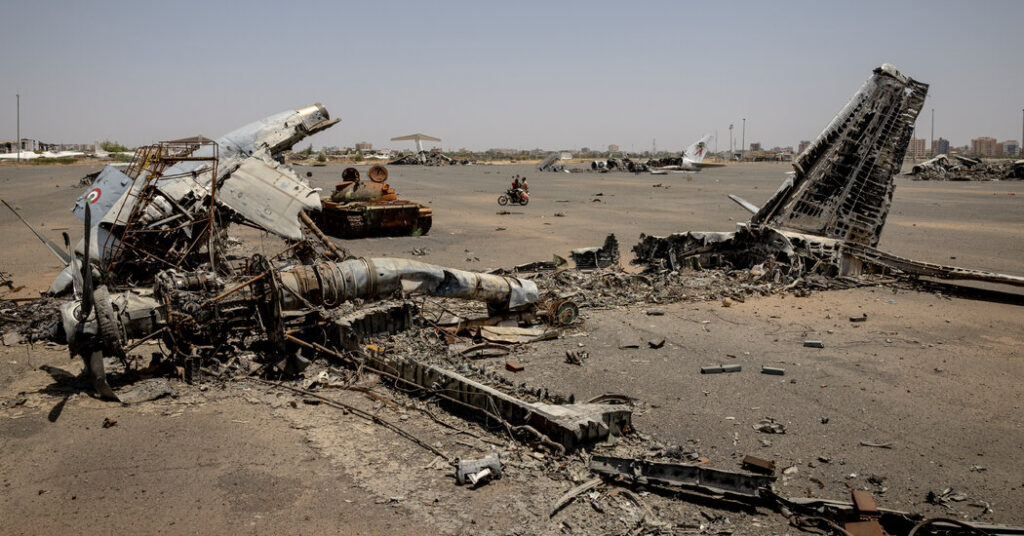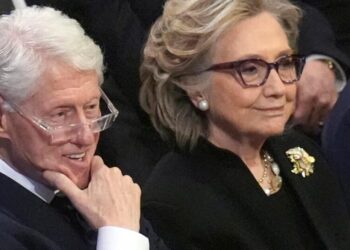Until this week, President Trump had viewed the war in Sudan as an insoluble mess, “crazy and out of control,” and not a crisis he wanted to get involved with, as he put it.
But then a visit by Crown Prince Mohammed bin Salman of Saudi Arabia to Washington appeared to inspire a conversion in the American president. After a briefing from the Saudi leader on Sudan’s history and culture — as well as its atrocity-filled war — Mr. Trump was sold.
“His Majesty would like me to do something very powerful having to do with Sudan,” he told a forum of business leaders on Wednesday. “We’re going to start working on it.”
Mr. Trump has frequently overstated his credentials as a peacemaker, once claiming to have solved eight wars in eight months. But in Sudan, where a disastrous civil war has drawn little Western attention despite creating the world’s greatest humanitarian crisis, his words arrived like a diplomatic thunderbolt.
Within hours, Sudan’s military leader, Gen. Abdel Fattah al-Burhan, effusively thanked Mr. Trump and Prince Mohammed for their intended intervention — a sharp change from the general’s attitude a few days earlier, when he spurned American-led diplomacy for a truce.
Analysts said that if Mr. Trump acted on his vow to end the atrocities “while at the same time stabilizing Sudan,” it could be a game changer in a war that began in April 2023, has killed up to 400,000 people, displaced 12 million and set off a famine.
“This could well be a turning point in ending this devastating war,” said Alan Boswell, the Horn of Africa director at the International Crisis Group, a research body dedicated to preventing and solving global conflicts.
Saudi Arabia, Egypt, Qatar and others have supported Sudan’s armed forces, while the United Arab Emirates has backed the Rapid Support Forces, the paramilitary group fighting the military. With so many countries, including U.S. allies, enmeshed in Sudan’s war on both sides, only “top-level focus” from both U.S. and Arab leaders could halt it, Mr. Boswell said.
But there was no immediate reaction to Mr. Trump’s statement from the Rapid Support Forces or the Emirates. That pointed silence hinted at the diplomatic challenge awaiting Mr. Trump if he presses ahead with his plan to bring peace to Sudan.
“A lot of people desperately want this to succeed,” said Kholood Khair, a Sudanese political analyst. “But I’m concerned that Sudan will get lost amid the competition between U.A.E. and Saudi Arabia.”
For Mr. Trump, she added, “it could end up being about how to keep the Arabs happy, and not very much about Sudan.”
As Mr. Trump made clear, his sudden interest in Sudan is driven largely by his desire to please a wealthy Gulf ally. At the least, though, his remarks represented the boldest claim yet by an American president that he would get involved in Sudan since the war erupted.
The Biden administration initially tried to broker a cease-fire, then imposed sanctions on Sudanese commanders and even declared a genocide in parts of Darfur, the western Sudanese region. It privately pressured other countries driving the fight, especially the Emirates, to pull back.
But President Joseph R. Biden Jr. rarely spoke about Sudan, and his administration’s cease-fire efforts ultimately proved fruitless.
More broadly, efforts to resolve the crisis have suffered a lack of political oxygen. Even as the war’s toll has climbed to shocking levels, it has often been overshadowed by the conflicts in Gaza and Ukraine.
The war’s profile has risen in the past month, since the Rapid Support Forces, or R.S.F., seized El Fasher, a famine-stricken city in Darfur. Breaking an 18-month siege, R.S.F. fighters embarked on a rampage against civilians, including massacres and rape, on an enormous scale, generating global outrage.
Mr. Trump, seeing some of the atrocities on video, asked aides if there was anything he could do, a senior U.S. official said, speaking on the condition of anonymity.
In fact, his chief adviser on Africa, Massad Boulos, had been trying to mediate a humanitarian truce since September. But Mr. Trump’s comments about Sudan on Wednesday suggested he was only vaguely familiar with that effort and didn’t give it much hope.
Now, Mr. Trump is signaling that he is taking over. “Tremendous atrocities are taking place in Sudan,” he wrote in a lengthy post on social media. “Arab leaders from all over the world,” led by Prince Mohammed, “have asked me to use the power and influence of the presidency to bring an immediate halt to what is taking place.”
Awkwardly for Mr. Trump, though, many of those same Arab leaders — among his closest and wealthiest allies, are on opposite sides of the fight.
Since the earliest days of the war, the Emirates has smuggled drones, artillery and other powerful weapons to the R.S.F., even as the group’s fighters have faced growing accusations from American officials of war crimes and genocide. The Emirates has consistently denied backing either side in the conflict.
On the other side are Saudi Arabia, Egypt and Qatar, which have variously provided Sudan’s military with diplomatic, financial or military support, European and American officials said.
Until recently, the Saudi involvement was rather lackluster. For the first year of the war, the United States and Saudi officials jointly led peace talks, to no effect. At American-organized talks in Switzerland last year, the Saudi approach seemed unfocused, American officials said at the time, largely because Prince Mohammed was not personally engaged.
That has changed in recent months.
For Prince Mohammed — whose country is just across the Red Sea from Sudan — the spiraling conflict presents a security threat, analysts say, raising the specter of an increase in African migrants trying to enter Saudi Arabia.
The conflict also challenges the prince’s ambitious plans to diversify his country’s oil-dependent economy and develop tourism.
A fracture with the Emirates may also have influenced his thinking. Prince Mohammed’s once-close relationship with the Emirati leader, Mohammed bin Zayed, has cooled in recent years, as the neighboring powers have begun to compete economically and jostle for strategic advantage in the wider region, especially the Horn of Africa.
Nowhere is that split more evident than in Sudan.
After Sudan’s military drove the R.S.F. out of the capital, Khartoum, last March, Prince Mohammed welcomed the military chief, General al-Burhan, to Saudi Arabia during Ramadan. The two men prayed together in Mecca.
Soon after that, attack drones rained on Port Sudan, the military’s de facto wartime capital on the Red Sea, just 180 miles across the water from the Saudi city of Jeddah. American officials viewed the strikes as a stunning demonstration of how the R.S.F.’s military capacities had grown because of Emirati support.
The tension between Saudi Arabia and the Emirates has led to “a dangerous ‘great game’-style contest for influence” in the Horn of Africa, said Anna Jacobs, author of a recent paper on that competition for the Century Foundation, a nonprofit based in New York.
“The Saudis are in catch-up mode,” she said. “They see the Red Sea as their traditional sphere of influence. It’s becoming clear, as the Emirates expands, that the reality on the ground does not reflect that.”
Brokering a cease-fire through the Emiratis, Saudis and other Arab powers is a good idea, analysts say, as it becomes clear that the road to peace in Sudan lies through the Middle East.
But it inevitably risks angering either the Saudis or the Emiratis, both staunch American allies who have made extravagant promises to invest in the United States and have business ties with Mr. Trump’s family.
And Mr. Trump’s cuts at the State Department this year have badly reduced its institutional expertise. That has left much of the work on Sudan until now in the hands of Mr. Boulos, a diplomatic neophyte — and father-in-law of Mr. Trump’s daughter Tiffany — who is also focused on bringing peace to the Democratic Republic of Congo.
Some Sudanese worry that brokering peace in Sudan through Middle Eastern powers will, ultimately, prioritize that region, not Africa.
“If Trump wants to make peace, he needs a strong envoy for Sudan,” said Quscondy AbdulShafi, a Sudanese research fellow at the Holocaust Museum in Washington. “Otherwise, Sudan will get lost again.”
Ismaeel Naar contributed reporting from Dubai, United Arab Emirates.
Declan Walsh is the chief Africa correspondent for The Times based in Nairobi, Kenya. He previously reported from Cairo, covering the Middle East, and Islamabad, Pakistan.
The post At Saudi Behest, Trump Vows to Seek Peace in Sudan, a Goal He Had Spurned appeared first on New York Times.




